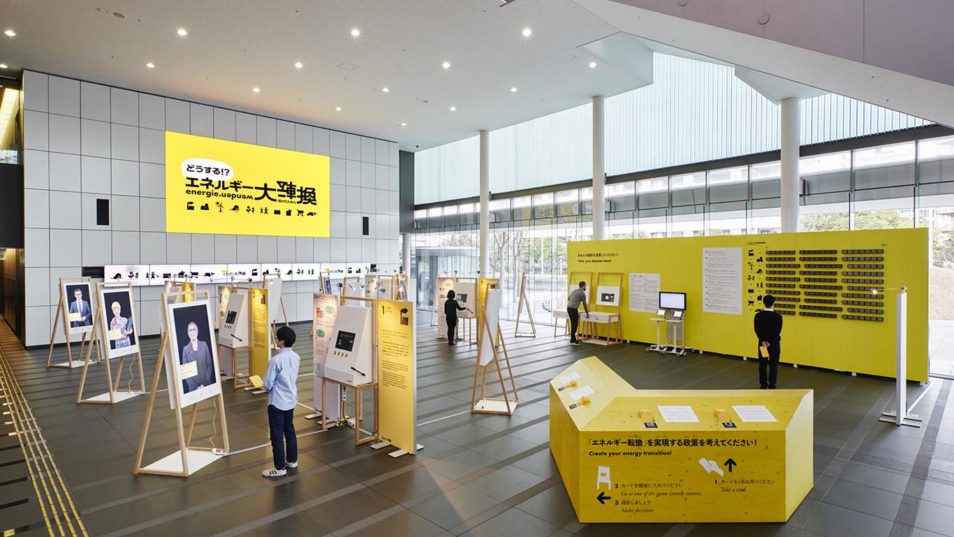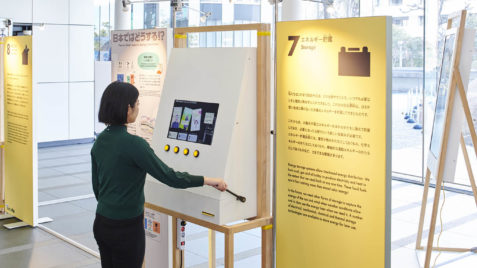“energie.wenden” (energy.transitions)
 © Miraikan
© Miraikan
The German exhibition “energie.wenden” (energy.transitions) was hosted at the Miraikan – The National Museum of Emerging Science and Innovation in Tokyo between 17 January and 27 February 2020*.
It was the first time that the exhibition had been hosted outside Germany, originally being held at the Deutsches Museum in Munich in 2017. In Tokyo, the exhibition was visited by 11,205 people. It was organised by the Miraikan and Deutsches Museum with the support of DWIH Tokyo as co-organiser.
The interactive exhibition featured a decision-making game in which visitors had to take on the role of politicians responsible for deciding on the right approach to their country’s energy transition. To assist them in doing so, visitors were guided through 10 stations, each dedicated to a different political question on which they had to decide. Visitors noted each decision on a card that they had received at the beginning, which was evaluated at the end, sorting visitors’ attitudes toward energy transition into such categories as “Environmentalist” or “Scientist” (Online Exhibition Tour: https://youtu.be/V6bOUk_WB80).
 Two events were held in conjunction with the exhibition: a Japanese-German mini symposium and a talk session on choices of electricity, house and car. In the talk session – held online due to Covid-19 measures – the outcomes of the decision-making game in Germany and Japan were compared (check here for the video). In Germany, 93,246 visitors took part in the decision-making game over the course of a year and nine months, while in Japan, 5,493 people participated during the 38 days for which the exhibition was open. Among others, the question of how to proceed with nuclear energy was answered differently in Japan and Germany: while 53% of participants in Germany chose to shut down nuclear power plants completely, only 28% of participants in Japan selected this option. In addition, the question of how to reduce CO2 emissions from power plants led to different outcomes: the majority of participants in Japan chose to subsidise natural gas (42%), while in Germany, the most popular answer was a carbon tax (the video of the talk session shows all results from 57 minutes in: https://www.youtube.com/watch?v=xpzWwRSk9jA&feature=youtu.be )
Two events were held in conjunction with the exhibition: a Japanese-German mini symposium and a talk session on choices of electricity, house and car. In the talk session – held online due to Covid-19 measures – the outcomes of the decision-making game in Germany and Japan were compared (check here for the video). In Germany, 93,246 visitors took part in the decision-making game over the course of a year and nine months, while in Japan, 5,493 people participated during the 38 days for which the exhibition was open. Among others, the question of how to proceed with nuclear energy was answered differently in Japan and Germany: while 53% of participants in Germany chose to shut down nuclear power plants completely, only 28% of participants in Japan selected this option. In addition, the question of how to reduce CO2 emissions from power plants led to different outcomes: the majority of participants in Japan chose to subsidise natural gas (42%), while in Germany, the most popular answer was a carbon tax (the video of the talk session shows all results from 57 minutes in: https://www.youtube.com/watch?v=xpzWwRSk9jA&feature=youtu.be )
Report by Jan Robin Sofinowski (DWIH Tokyo intern)
*The exhibition was originally due to run until 29 March, but had to close earlier due to measures to prevent the spread of the novel coronavirus.
